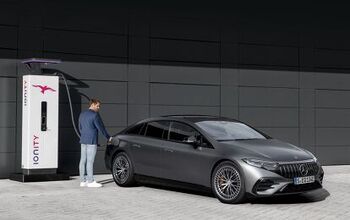November 2017 Pickup Sales Winners and Losers

Barring a blockbuster December, 2017’s light duty vehicle sales stand to dip below 2016’s record 17.55 million units. The National Automobile Dealers Association forecasts 17.1 million sales in the U.S. this calendar year, with 2018 sales falling to 16.7 million vehicles.
Bad news for automakers? Not if profits stay up. And nothing generates profits quite like large volumes of high-margin vehicles — pickup trucks, to be exact. While November 2017 was a relatively flat month for the industry, a closer look at the pickup segment shows America’s love affair with trucks is keeping the money taps flowing.
Prepare to pick your jaw off the floor, because the Ford F-Series line remained, by far, the best-selling truck in the United States last month. Shocker. With 72,769 trucks sold, the F-Series had its best November in 16 years. Sales rose 0.9 percent, year-over-year, with volume over the first 11 months of 2017 now up some 10.1 percent. Yes, it’s nice being on top.
At General Motors, the sales picture was more of a mixed bag. With four nameplates covering the midsize and full-size segments, November amounted to a good month for Chevrolet, but only Chevrolet. With 46,441 sales, the Chevrolet Silverado was the top-selling GM truck. Sales rose 2.6 percent, year-over-year, though this year’s tally is still 0.5 percent less than last year’s. GMC Sierra sales sank 4 percent, year-over-year. That model’s year-to-date performance is also in the red — down 3.5 percent compared to 2016.
The picture was much the same for the midsize Chevrolet Colorado and GMC Canyon twins. Colorado’s strong sales month — up 19.3 percent, year-over-year — wasn’t replicated over at GMC. Canyon sales sank 26.4 percent, year-over-year. Buyers chose the Colorado over the Canyon by a 4:1 margin, with both models heading in the opposite direction in year-to-date sales (the Chevy’s up 4.1 percent YTD, the GMC’s down 14.3 percent).
If you were looking for a lot of movement over at Ram, prepare to dash those hopes. As the brand awaits the debut of the next-generation 1500 in January, pickup sales sank 0.5 percent, year-over-year. The brand’s still up 3.2 percent over the first 11 months of 2017, though.
Nissan recorded zero vehicles sold in November, truck or otherwise, but only because computer problems screwed up the company’s sales tally. We’ll update this post when those figures roll in.
Toyota, on the other hand, is well aware of its sales performance, and there’s good reason for the automaker’s Christmas cheer. Tacoma sales rose 4.3 percent, year-over-year, with the top midsize pickup nameplate now up 3 percent on a year-to-date basis. The full-size Tundra found more buyers in November, as well. Sales rose 1.3 percent, year-over-year, for a 1.4 percent YTD finish. A good December would see the model surpass last year’s sales, which marked a climbdown from 2015’s post-recession sales peak.
Let’s face it, no one working at Honda has any delusion that the company’s fortunes hinges on the unibody Ridgeline. That’s good, because Honda’s entry in the midsize pickup segment tanked yet again. November sales plummeted 24.7 percent, year-over-year.
It’s the fifth straight monthly loss for the second-generation model, which only went on sale in June 2016. Despite the poor showing, the Ridgeline did manage to outsell the Canyon by 100 units.
[Image: Fiat Chrysler Automobiles]

More by Steph Willems
Latest Car Reviews
Read moreLatest Product Reviews
Read moreRecent Comments
- Oberkanone Tesla license their skateboard platforms to other manufacturers. Great. Better yet, Tesla manufacture and sell the platforms and auto manufacturers manufacture the body and interiors. Fantastic.
- ToolGuy As of right now, Tesla is convinced that their old approach to FSD doesn't work, and that their new approach to FSD will work. I ain't saying I agree or disagree, just telling you where they are.
- Jalop1991 Is this the beginning of the culmination of a very long game by Tesla?Build stuff, prove that it works. Sell the razors, sure, but pay close attention to the blades (charging network) that make the razors useful. Design features no one else is bothering with, and market the hell out of them.In other words, create demand for what you have.Then back out of manufacturing completely, because that's hard and expensive. License your stuff to legacy carmakers that (a) are able to build cars well, and (b) are too lazy to create the things and customer demand you did.Sit back and cash the checks.
- FreedMike People give this company a lot of crap, but the slow rollout might actually be a smart move in the long run - they can iron out the kinks in the product while it's still not a widely known brand. Complaints on a low volume product are bad, but the same complaints hit differently if there are hundreds of thousands of them on the road. And good on them for building a plant here - that's how it should be done, and not just for the tax incentives. It'll be interesting to see how these guys do.
- Buickman more likely Dunfast.


































Comments
Join the conversation
I was a bit surprised. Ordered a Laramie 2500 diesel and it was $11k off the top. I figured ordering one wouldn't have nearly the discount of those on the lot.
Turbo V6's and aluminum bodies sure have hurt Ford!